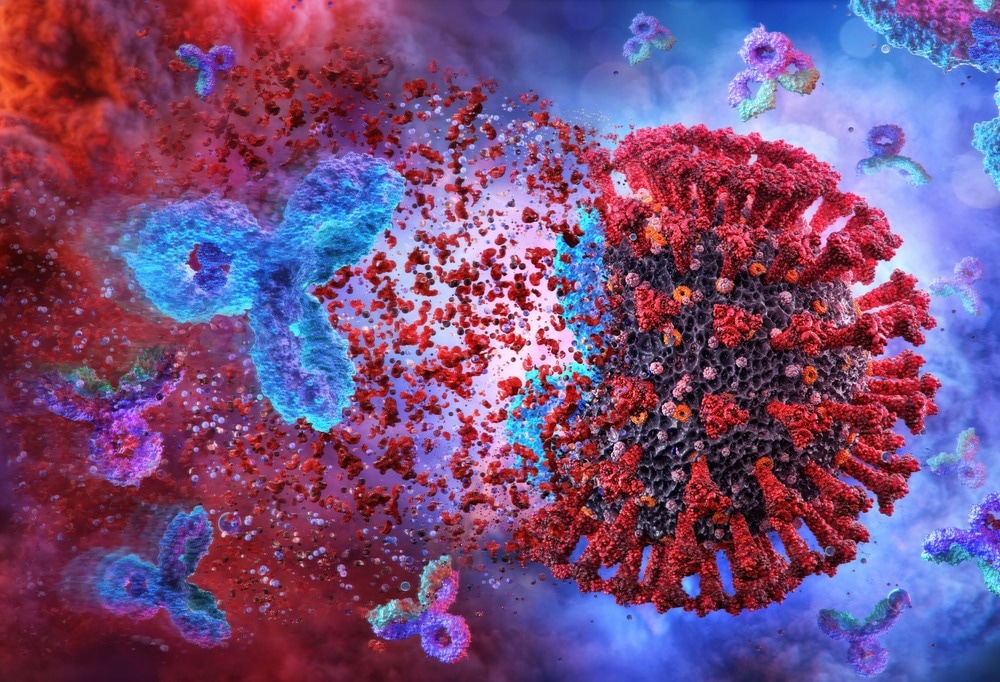These were coronavirus disease 2019 (COVID-19) vaccinated only vaccinees (uninfected and vaccinated), COVID-19-recovered vaccinees (vaccinated and convalescent), and individuals with severe acute respiratory syndrome coronavirus 2 (SARS-CoV-2) Delta or Omicron BA.2 variant of concern (VOC) breakthrough infections (BTI, infected and vaccinated).

Study: Lasting first impression: Pre-existing immunity restricts mucosal antibody responses during Omicron breakthrough. Image Credit: CoronaBorealisStudio/Shutterstock.com

 *Important notice: medRxiv publishes preliminary scientific reports that are not peer-reviewed and, therefore, should not be regarded as conclusive, guide clinical practice/health-related behavior, or treated as established information.
*Important notice: medRxiv publishes preliminary scientific reports that are not peer-reviewed and, therefore, should not be regarded as conclusive, guide clinical practice/health-related behavior, or treated as established information.
Background
SARS-CoV-2 vaccines, especially messenger ribonucleic acid (mRNA) booster doses, induce systemic anti-SARS-CoV-2 antibodies that protect against COVID-19 severity outcomes. However, current COVID-19 vaccines elicit limited antibodies that neutralize SARS-CoV-2 at mucosal sites.
The gap in mucosal antibody (Ab)-based immunity could lead to vaccine breakthrough SARS-CoV-2 infections. Evaluating the potential of humoral functional immune responses at mucosal surfaces could aid in developing strategies for sustained immune protection against emerging SARS-CoV-2 VOCs.
About the study
In the present study, researchers evaluated systemic and mucosal immune responses among previously SARS-CoV-2-infected and uninfected COVID-19 vaccinees.
The team recruited individuals with positive or negative prior COVID-19 history from a priorly published study cohort, vaccinated with Pfizer-BioNTech’s BNT162b2, AstraZeneca’s ChAdOx1 nCoV-19 vaccines, and mRNA vaccine boosters.
In addition, COVID-19 vaccinees with polymerase chain reaction (PCR)-verified Delta VOC or BA.2 VOC BTIs, were recruited. Saliva and blood samples were collected before and after COVID-19 vaccination.
Immune responses involving anti-SARS-CoV-2 IgM, IgA, IgG, and their subclasses in sera, saliva, and tear fluid from pre-COVID-19 pandemic cohort and COVID-19 vaccinees were evaluated using multiplexed beaded arrays.
The arrays comprised the SARs-CoV-2 Wuhan-Hu-1 strain spike (S) protein, receptor-binding domain (RBD), spike subunit 1 (S1), and subunit 2 (S2) proteins. Anti-SARS-CoV-2 antibody engagement to Fc gamma receptor (FcγR) proteins was assessed using surrogate FcγR dimers, including FcγR2a, a cluster of differentiation 32 (CD32); FcγR3a and CD16.
Neutralization of SARS-CoV-2 VOCs such as Alpha, Beta, Delta, and Omicron was evaluated using surrogate RBD-angiotensin-converting enzyme 2 (ACE2) inhibition assays.
SARS-CoV-2 RNA was quantified using quantitative PCR. Piecewise modeling was performed to estimate the activation times and growth rates of immunological responses after BTIs.
Results
Salivary samples of COVID-19 vaccinees with prior COVID-19 history showed improved SARS-CoV-2 neutralization, salivary IgA titers and Fc gamma receptor engagement than uninfected COVID-19 vaccinees.
However, salivary IgA responses were biased toward S and S2 proteins. The mRNA vaccinations boosted anti-SARS-CoV-2 IgG-2,4 titers in tear and saliva biofluids and serum. Immunoglobulin G and not immunoglobulin A titers against breakthrough SARS-CoV-2 VOC infections were narrowed and attenuated by enhanced pre-existing COVID-19 vaccine-elicited immune responses against the SARS-CoV-2 Wuhan-Hu-1 strain.
Salivary Ig delayed immune boosting initiation after breakthrough SARS-CoV-2 infection, especially BA.2 infections; however, it increased swiftly thereafter.
Individuals who were SARS-CoV-2 infected before vaccination showed more robust systemic neutralization and IgG titers than the vaccinated-only cohort. Previous mucosal SARS-CoV-2 exposure due to prior COVID-19 improved mucosal IgA and IgG titers induced by subsequent intramuscular COVID-19 vaccinations.
After two SARS-CoV-2 exposures, remarkable differences in salivary Ig titers were observed between COVID-19-recovered vaccinees and those with prior history of vaccination only.
Salivary IgA titers among COVID-19-recovered vaccinees declined after the second SARS-CoV-2 vaccination, whereas salivary IgG titers were greater among COVID-19 recovered vaccinees than the vaccinated-only cohort after three antigen exposures, mainly driven by IgG1 responses.
After three antigen exposures, greatly increased IgG2 and IgG4 responses were noted, especially for S and S2. The mRNA vaccine booster increased salivary IgG titers but did not induce IgG4 responses, mimicking those in plasma.
Salivary-neutralizing antibodies were induced following SARS-CoV-2 antigen exposure locally at the mucosal level, not by intramuscular mRNA vaccinations alone. Broad cross-reactivity in mucosal IgA against VoC S proteins was observed.
The relative abundance of cross-reactive total IgG in all cohorts against Omicron was smaller than against Alpha and Delta in saliva and plasma after vaccination. Salivary IgA titers and FcγR3a Ab-mediated responses were enhanced during BTIs.
Although limited neutralization of new SARS CoV-2 antigens, FcγR engagement, and salivary IgA could play vital roles in localized cross-reactive immunity at mucosal surfaces.
However, ancestral-centric pre-existing immunity might influence the extent and type of salivary FcγR engagement and Ab titers during BTIs. Higher pre-existing serological Ab titers could negatively impact the magnitude of systemic Ab responses induced during BTIs, in spite of comparable SARS-CoV-2 loads in the nasopharyngeal swabs.
The influence of imprinting from the ancestral SARS-CoV-2 Wuhan-Hu-1 strain appeared more obvious with FcγR engagement responses, probably due to more involvement of conserved cross-protective Ab titers, in comparison to neutralization.
Swift recall of salivary Ab titers in Omicron BTI was observed. The poorer growth rates and delays in serum Ab titers likely account for the poorer magnitude of serological responses against BA.2 after 14 days of BA.2 BTIs.
Conclusion
Overall, the study findings showed that intramuscular SARS-CoV-2 vaccinations might be inadequate to elicit long-term mucosal antibodies, even among individuals with prior COVID-19 history, and such gaps in mucosal surface immunity, especially lacking mucosal IgA and neutralizing antibodies could contribute to the elevated rates of Omicron BTIs.
The differences in Ab kinetics between the humoral compartments underscore the importance of local responses in resolving mucosal infections, especially BA.2 BTIs. The findings highlight the need for effective mucosal COVID-19 vaccines.

 *Important notice: medRxiv publishes preliminary scientific reports that are not peer-reviewed and, therefore, should not be regarded as conclusive, guide clinical practice/health-related behavior, or treated as established information.
*Important notice: medRxiv publishes preliminary scientific reports that are not peer-reviewed and, therefore, should not be regarded as conclusive, guide clinical practice/health-related behavior, or treated as established information.